(850) 201-6200
TTY: (850) 201-8429
This publication is available in alternate format upon request.
Tallahassee Community College
444 Appleyard Drive
Tallahassee, FL 32304
Nondiscrimination Policy: Tallahassee Community College does not discriminate against any person on the basis of race, color, ethnicity, genetic information, national origin, religion, gender, marital status, disability or age in its programs and activities. Inquires regarding the nondiscrimination policies may be directed to:
Renae Tolson, Equity Officer
Room 146 Administration Building
444 Appleyard Drive
Tallahassee, FL 32304-2895
(850) 201-8510
Tolsonr@tcc.fl.edu
Smoking Policy: All buildings and grounds are nonsmoking unless indicated otherwise. Smoked is permitted in all parking lots.
Police/Campus Safety: TCC’s Campus Police Department is located in the Centre Building. Students can find campus crime statistics on the TCC Web site at tcc.fl.edu.
Message from the President
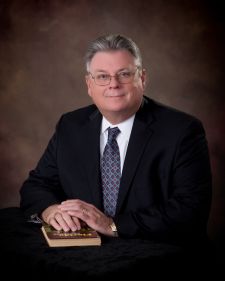 Welcome to Tallahassee Community College. You have made a great choice for your education and your future! Welcome to Tallahassee Community College. You have made a great choice for your education and your future!
Whether you plan to transfer to a university or earn a career degree or certificate, TCC offers you a unique combination of faculty expertise, rigorous programs and courses, superior facilities and a complete system of support.
TCC’s faculty members are focused on teaching and dedicated to student success. The Learning Commons, library and academic computing labs also provide extraordinary resources.
Student success specialists are stationed in classroom buildings, the Learning Commons and the Student Union to give you easy access to advising services. The Career Center can help you identify your professional goals and connect with internships that will open doors to your future.
Did you know that students who are engaged in the campus and community tend to be more successful in college? Our academic teams, arts organizations, clubs, athletic and recreation programs, student government activities, and special events offer many opportunities to participate, to lead and to develop skills you will use long after graduation.
By the way, this is TCC’s first e-catalog for Web and mobile use. We made the switch in order to give you greater access to up-to-date information and help you stay connected with the College, its programs and resources. I hope you will explore all the features of the new catalog, which gives you the ability to create your own portfolio of courses, programs and resources, to truly take control of your education experience.
Whether you are taking your first class at TCC or nearing graduation, our highest priority is helping you be successful, complete college and reach your goals. Thank you for making TCC your college of choice.
Sincerely,

District Board of Trustees
The District Board of Trustees is the policymaking body for Tallahassee Community College. Trustees are appointed by the governor and confirmed by the Florida Senate.
 |
Allison DeFoor, Chair, Dr. DeFoor was appointed to the board in 2009 by Governer Charlie Crist. DeFoor in a principal in the Fiorentino Group. DeFoor began his academic career at a community college, he went on to become a lecturer at several universities. As a public servant, DeFoor did significant work in public policy on Everglades restoration. He is now involved in the faith-based prison/penal reform movement. DeFoor represents Wakulla County.
|
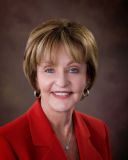 |
Dana G. Callen, Vice Chair – Dr. Callen was appointed by Governor Charlie Crist in 2009. She is a principal with Callen Consulting. Callen was previously a school administrator for Leon County Schools and has taught at St. Mary’s University, Florida State University and Tallahassee Community College. She holds certification in Family and County Court Mediation from the Florida Supreme Court and was selected for Harvard University’s Writing, Reading and Civic Education Institute. She earned a Ph.D. from Florida State University and also holds three master’s degrees. Callen represents Leon County. |
|

|
|
| Donna G. Callaway – Ms. Callaway, appointed by Governor Rick Scott in February 2012, previously served on the Board of Trustees from 1999‐2004. She was first appointed in 1999 and reappointed in 2002, both times by then‐Governor Jeb Bush. Her prior service included a term as board chair in 2003‐04. Callaway has been the principal of Tallahassee’s Raa Middle School since 2008, as well as from 1994‐2004. An educator since 1961, she has served as a classroom teacher, media specialist and assistant principal. She also served four years (2004‐08) on the Florida State Board of Education. Callaway represents Leon County. |
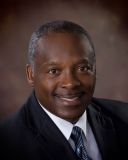 |
Mr. Eugene Lamb, Jr. – Mr. Lamb was appointed to the board in 2007 by Governor Charlie Crist. He was a teacher in the Leon County school district for 30 years. Also active in neighboring Gadsden County, Lamb has served on the Gadsden County Commission since 2004. Lamb represents Gadsden County.
|
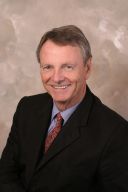 |
Frank Messersmith – Mr. Messersmith was appointed to the board by Governor Jeb Bush in 1999; he was reappointed by Governor Charlie Crist in 2007. A former legislator and member of the Florida Public Service Commission, Messersmith is currently a consultant specializing in legislative and regulatory matters. |
 |
Kimberle Moon – Dr. Moon was originally appointed to the board by Governor Jeb Bush in 2005; she was reappointed by Governor Charlie Crist in 2009. She serves on the music faculty of the Baptist College of Florida and as a singing voice specialist for the Tallahassee Professional Voice Clinic. A resident of Gadsden County, she earned a Doctorate of Musical Arts from The Ohio State University. Moon represents Gadsden County. (Note: Dr. Moon resigned from the board on April 15, 2013.) |
 |
Karen B. Moore – Ms. Moore was appointed to the board in 2007 by Governor Charlie Crist and re‐appointed in 2012 by Governor Scott. She is the president of Moore Consulting Group, a public relations and advertising firm. Moore previously served as president of the TCC Foundation Board, chairing the College’s first capital campaign, which secured $10 million. She also chairs the Economic Development Council of Tallahassee/Leon County. Moore represents Leon County. |
Mission
Institutional Mission: Tallahassee Community College is an open-admission comprehensive community college committed to preparing students for university transfer and to meeting economic and workforce needs. Its mission is to attract and support an outstanding faculty and staff that pursue excellence in teaching and learning through educational programs and services that promote the intellectual, social, and personal development of students; to assist students in developing the ability to think critically, creatively and reflectively; and to prepare students for productive and satisfying lives.
Teaching Mission: The faculty at TCC is committed to creating a learning environment for all students that fosters the development of higher-order thinking skills and critical-thinking skills that are grounded in an understanding of the fundamental concepts of the disciplines in which they are taught.
Vision
Tallahassee Community College exists to transform lives and communities by providing access to affordable, high quality instruction in a supportive environment that embraces the diverse needs of its students.
Statement of Philosophy
Tallahassee Community College has established an educational program to provide instruction and experiences that will enable the individual to understand the democratic value system and the complex customs and institutions through which that system operates. In a free society, people must be disciplined by a sense of respect for others and a love of truth and justice. The basic principle on which this system is founded is the belief that each individual has dignity and worth. A corollary principle is the concept that each individual has the obligation to further the general welfare of society. The College believes that these principles are enhanced when each person is given access to differing and competing views. Through this process, the individual can develop the ability to make rational decisions. In support of these principles, the College believes in the policy of open admissions and believes that each person should have an equal opportunity to develop as fully as possible through education. The College is committed to providing an educational experience based on the highest academic and professional standards, mutual respect, tolerance for diverse ideas and a learning environment which is caring and supportive in order to meet the diverse needs reflective of its students and the community.
Strategic Plan
The Tallahassee Community College Strategic Plan focuses on goals and outcomes related to the following priorities:
- Student Success
Provide programs and services to students that increase the opportunity for students to define and reach their educational and career goals by connecting them to the appropriate college resources and empowering them to take responsibility for their education.
- Enhanced Learning
Deliver academic programs and learning support services that provide students with the appropriate resources for learning the knowledge and skills needed for the workplace or for transfer to baccalaureate programs in state universities. This priority requires exceptional levels of performance and achievement by all faculty and staff and therefore includes campus support and resources to meet professional growth expectations for all employees.
- Community
Provide innovative solutions that strengthen our region’s economy and workforce competitiveness.
- Alternative Delivery Systems
Deliver curriculum and learning support resources at appropriate times and in appropriate formats to meet student needs.
- Technology and Out of Class Support
Implement the appropriate technology and services to facilitate the learning environment for every Tallahassee Community College student.
- Finance
Provide effective stewardship to enhance new and existing revenues and resources to promote growth and increase cost effectiveness.
- Facilities
Develop and construct capital projects that enhance the learning centered environment, improve physical facilities and ensure physical safety.
- Foundation
Develop and implement systems for attracting financial resources to enhance student access and promote excellence in teaching and learning.
Guiding Principles
The Strategic Plan is guided by a number of principles. These principles are centered in governing the institution with integrity and in an ongoing commitment to enhance the quality of the institution’s programs and services.
Innovation: The College fosters innovation and creativity in educational programs, instructional methods and services.
Diversity: The College promotes a climate that values and celebrates diversity and an academic culture that recognizes the strengths and talents of all members of the community.
Excellence: The College strives to develop and maintain high academic and professional standards with an emphasis on excellence in all areas of the College.
Access: The College serves students with diverse backgrounds and provides equal access to educational and professional programs that further the students’ varied interests and goals.
Success: The College promotes student success by enabling students to develop the skills and knowledge needed to achieve their individual goals.
Underlying the Strategic Plan are four assumptions that relate to resources, institutional research, the use and availability of appropriate technologies and communication.
Resources: The Strategic Plan assumes that the College will explore and actively seek additional funding sources to adequately support the initiatives in the Plan.
Institutional Research: The Strategic Plan assumes that the College will support the institutional research functions necessary to develop and assess the initiatives in the Plan.
Technology: The Strategic Plan assumes that the College will acquire and utilize appropriate technologies to support and advance the initiatives in the Plan.
Communication: The Strategic Plan assumes that the College will develop and disseminate information necessary to implement, support and advance the initiatives in the Plan.
History of the College
Tallahassee Community College opened in 1966 to serve the post-high school educational needs of students from a district comprised of Gadsden, Leon and Wakulla counties. Although most students still come from this district, the College enrolls students from throughout Florida, from most states and many foreign countries. TCC has grown from an enrollment of 698 students in Fall 1966 to more than 15,000 students today.
1966-1975
An article published on September 13, 1966, in The Tampa Tribune, proclaimed, “New Tallahassee JC a success before it opens.” A few days later, at Godby High School and across town at Rickards High School, Tallahassee Junior College welcomed nearly 700 students its first year. Three new buildings were ready for occupancy on Appleyard Drive in time for the second year of operation. In 1968, the Legislature established the District Board of Trustees as the governing authority for the College; Tallahassee businessman Earl Lambert served three terms as the first board chairman. Tallahassee Junior College became Tallahassee Community College (TCC) in 1970 and one- and two-year occupational programs, including nursing, were added to the curriculum. The 1,000th person graduated. Dental hygiene was added and College enrollment approached 3,000.
1976-1985
During the second decade, enrollment steadily grew to more than 5,000. President Fred W. Turner retired and Dr. Marm M. Harris was named TCC’s second president. An artist series began to attract community leaders to the campus, enhancing the town/gown relationship. The TCC Foundation was established and the Lifetime Sports Complex opened. In 1983, Dr. James H. Hinson, Jr., became TCC’s third president and led the College through a period of enrollment growth and legislative appropriations. Also in 1983, TCC students won the Math Olympics state title, beginning a tradition of student success in academic competition. A study reported TCC had a $47.2 million positive economic impact in the community.
1986-1995
As the fastest growing community college in Florida, TCC saw its enrollment jump by nearly 1,000 students in the first term of the third decade. By the end of the decade, enrollment had doubled. In 1988, TCC was first among Florida community colleges in the proportion of faculty members holding a Ph.D. Eyrie, the student literary magazine, was named best in the nation, and the student newspaper won state, regional and national accolades. An athletic program was re-established with a strong base in academics. A new library and administration building were added. The campus grew from 54 acres to more than 140. President Hinson led the College through a decade that also saw extensive renovation and campus infrastructure upgrades. TCC’s softball team won the National Junior College Athletic Association slow pitch championship in 1994.
1996-2005
With its fourth president, Dr. T.K. Wetherell, at the helm, numerous new career programs were added in the fourth decade, and cooperation with universities was enhanced. In 2000, TCC formed its first university partnership with Flagler College and has since partnered with Embry-Riddle Aeronautical University (2001), Barry University (2003), Saint Leo University (2006) and Thomas University (2010). As a result, students can pursue bachelor’s and graduate degrees without leaving TCC’s campus.
The College’s infrastructure continued to grow by leaps and bounds. In the mid-1990s, a new Student Union was constructed, as was the Technology and Professional Programs Building, while a renovated facility became the Academic Computing Center. After the turn of the century, TCC opened the History and Social Sciences Building, named for President Wetherell; the Computer Technology Building; and the Center for Workforce Development.
The TCC Alumni Association and Eagle Athletics Hall of Fame were established. The Challenge Scholarship Program and many other scholarships were established. Florida Governor Jeb Bush was the 2000 commencement speaker. The Brain Bowl team won its first state title. TCC acquired the Pat Thomas Law Enforcement Academy (PTLEA).
Dr. Bill Law became TCC’s fifth President in 2002 and began launching new initiatives that resulted in greater community involvement for TCC.
2006-present
TCC celebrated its 40th anniversary in 2006, highlighted by a series of community and alumni events, including the TCC Alumni Hall of Fame ceremony, Community Day at TCC and the 40th Anniversary Gala. That same year, TCC successfully completed its first capital campaign. The $10 million campaign included the largest private donation in the College’s history, a $2 million gift from Tallahassee’s Ghazvini family. Under President Bill Law’s leadership, TCC expanded its healthcare programs and placed a major emphasis on workforce development. Innovative teaching methods began to draw national recognition for faculty.
The William D. Law, Jr. Learning Commons opened in 2008, bringing all of the College’s academic support facilities together beneath one roof. In 2009, the TCC District Board of Trustees approved creation of the Florida Public Safety Institute (FPSI) to be the umbrella entity for the Pat Thomas Law Enforcement Academy and several other training academies housed on the site in Gadsden County. A new FPSI conference center opened in 2009. That same year, TCC broke ground on the Ghazvini Center for Healthcare Education. Reflecting its active commitment to student success, the College implemented electronic learning plans that allow students to monitor their progress toward their academic and career goals. The Advanced Manufacturing Training Center (AMTC), funded through a Department of Defense grant, opened on the main campus in August of 2010. The AMTC offers customized, high-quality manufacturing training in a state-of-the-art facility.
The presidency of Dr. Jim Murdaugh was launched on November 15, 2010. Murdaugh began his tenure as the College was increasing its focus on healthcare training programs and other workforce initiatives, while continuing to enhance the academic and support services provided to students in the university transfer program. In early 2011, TCC opened a veterans center on the second floor of the Student Union. In the fall of the same year, TCC’s Ghazvini Center for Healthcare Education opened near Tallahassee’s two major hospitals. The services provided by the TCC Wakulla Center are set to expand in late 2012 as TCC enters a five-year lease on a larger facility in Crawfordville.
TCC’s Commitment
TCC welcomes recent high school graduates and adults who wish to start or continue a college education. In addition, the College welcomes individuals who want to take courses for their enrichment or enjoyment. The policy of TCC’s District Board of Trustees is that no person shall, on the basis of race, color, ethnicity, genetic information, national origin, sex, disability or age, be excluded from participation in, be denied the benefits of, or be subjected to discrimination or harassment under any educational program or activity, or in any employment conditions or practices of the College.
Many TCC students are working towards the Associate in Arts degree for transfer to a four-year college or university. Many others seek one-year certificates or two-year degrees in career areas. TCC also provides noncredit courses designed to enhance the skills necessary to maintain current employment or to re-train for a new occupation.
The faculty at TCC is best described as a teaching faculty. Faculty members are able to devote most of their time to teaching, to working with students individually and to helping students make the adjustment to college. Teachers impart knowledge to stimulate critical thinking, develop skills, and broaden and enrich student interest. Their major efforts are directed toward helping students master subject matter and reach their potential.
TCC uses a variety of educational delivery methods. Courses may be taught in the traditional campus classroom setting or at off-campus sites. Many courses are available through distance learning, including Web-based courses, hybrid courses and self-paced instruction. The College also offers a full schedule of evening courses, making it more convenient for nontraditional students, to pursue their academic and career goals.
The College is committed to making all its programs, services and facilities accessible to and usable by persons with disabilities in order for students to successfully transition to college and obtain maximum benefit from the educational experience.
Accreditation
Tallahassee Community College is accredited by the Commission on Colleges of the Southern Association of Colleges and Schools to award the associate degree and certificates. Contact the Commission on Colleges at 1866 Southern Lane, Decatur, Georgia 30033-4097 or call 404-679-4500 for questions about the accreditation of Tallahassee Community College. Normal inquiries about the institution, such as admission requirements, financial aid, educational programs, etc., should be addressed directly to Tallahassee Community and not to the Commission’s office. The Commission is to be contacted only if there is evidence that appears to support an institution’s significant noncompliance with a requirement or standard.
Several healthcare programs are examined and accredited by specialized accrediting associations:
Dental Hygiene and Dental Assisting: American Dental Association Commission on Dental Accreditation
Nursing: Currently pursuing accreditation through the National League for Nursing Accrediting Commission
Paramedic: Commission on Accreditation of Allied Health Education Programs upon the recommendation of the Committee on Accreditation of Educational Programs for the Emergency Medical Services Professions
Respiratory Care: Committee on Accreditation for Respiratory Care
Additionally, the College provides cooperative programs with other accredited institutions that lead to certain associate degrees and programs of shorter duration that lead to certificates.
TCC Foundation
The Tallahassee Community College Foundation is the private fundraising arm of the College. A not-for-profit corporation created under Florida law, it is governed by a board of directors made up of community leaders. The Foundation is dedicated to supporting the needs of the College not met by state funding. Its mission is to encourage and receive private gifts and contributions and to account for, manage and help invest monies and assets given to enhance the College’s educational offerings. The Foundation’s investment program seeks to maximize return on investments with minimal risk.
The Foundation consistently provides essential support that allows campus life to flourish. This includes the development of scholarships for students; procurement of needed facilities and special equipment; assistance for faculty and staff; and support for student activities, the Alumni Association, the TCC Eagle Boosters and the Association of Retired Faculty and Staff.
Alumni Association
The TCC Alumni Association serves as the liaison between Tallahassee Community College and its alumni to promote support for TCC and excellence in education. Members are goodwill ambassadors who promote the general welfare and vision of the College, while communicating the excellence of TCC to the community.
The Alumni Association welcomes graduates and friends of the College to its membership. Governed by a board of directors comprised of dedicated alumni, the Association sponsors the Alumni Brick Circle of Remembrance, the Alumni Hall of Fame, the Alumni Scholarship for returning students, and a newsletter for graduates and friends. The Association also supports events that bring alumni together, along with initiatives such as TCC’s African-American History Month Calendar and Women’s History Month ceremony.
The Alumni Association maintains visibility with currently enrolled students by having a student representative on its board of directors, providing scholarships, sponsoring a booth at student orientation and providing complimentary memberships to first-year alumni.
Center for Workforce Development
Tallahassee Community College’s Center for Workforce Development offers customized courses and services to enhance employees’ careers, programs to improve business effectiveness, and support for returning adult learners. Targeted workforce training is offered in fields such as allied health, business, information technology, manufacturing, construction and trades. To refine professional skills needed for in-demand jobs at local businesses, training is offered in areas such as leadership, teamwork and supervision. Workforce Development adapts to the evolving needs of the community, customizes offerings based on solid research and produces programs that positively impact north Florida’s economy.
The Center for Workforce Development offers program at the main campus, The Wakulla Center, the Quincy House and the TCC Capitol Center. For information about courses, programs and facilities, call (850) 201-8760 or visit workforce.tcc.fl.edu.
Adult Education
The Adult Education Department includes Adult Basic Education (ABE), General Educational Development (GED) and English for Speakers of Other Languages (ESOL). These programs provide support for the development of basic skills in reading, writing and mathematics and offer learners the opportunity to acquire the knowledge and life skills needed to function effectively as workers, citizens and family members in a changing world. Low-cost adult education programs are available in Gadsden, Leon and Wakulla counties. For information, call (850) 201-6104.
Business and Professional Development
Business and Professional Development courses are offered to local employers and individuals seeking to enhance their professional skills or acquire the latest industry certifications. Topics range from online retail sales representative, online customer service representative and frontline supervision to skills for the administrative professional and professional writing skills. Workforce Development also offers certifications and renewals of professional licenses in the areas of insurance, real estate and certified financial planning. For information, call (850) 201-8069.
Conferences and Events, Facilities Rental
The Center for Workforce Development offers state-of-the-art conference and event space on the main campus and at the TCC Capitol Center.
The main campus facility is ideal for conferences, seminars, banquets and trade shows for two to 250 participants. Venues include a board room, auditorium, banquet hall, computer labs and traditional classroom spaces.
The TCC Capitol Center is located within easy walking distance of the Capitol. In addition to event space rentals, business suites and offices are available for annual and short-term lease to companies and individuals who need convenient access to the downtown area or the Capitol Complex.
For information about main campus conference and event facilities, call (850) 201-6058. For information about the TCC Capitol Center, call (850) 201-7662.
Construction and Skilled Trades
The Center for Workforce Development offers construction and skilled trades training programs that provide a foundation for entry-level employees to transition from the classroom to employment and for current employees to upgrade their skills. Programs include heating, ventilating and air conditioning (HVAC); plumbing; electrical; low voltage cabling; masonry; heavy equipment operator (backhoe); drywall installation and finishing; and carpentry. Workforce Development also offers Occupational Safety and Health Administration (OSHA) employee safety courses. TCC is a certified National Center for Construction Education and Research (NCCER) training facility and provides a variety of NCCER industry-recognized certificate programs. Registered apprenticeship programs in electrical and masonry are available. For information, call (850) 201-8722.
Corporate Services
Corporate Services provides solutions to help organizations perform at optimum levels. Our staff and consultants assist public agencies and private companies in hiring and promoting the right people through prehire employee assessment, identifying any performance gaps, and developing strategic, cost-effective solutions to close those gaps. Corporate Services provides customer and employee surveys and, when training is the desired solution, customized training tailored to the organization. Our systemic approach, which focuses on employee, process and organizational performance, improves employee retention, employee and customer satisfaction, productivity, and the bottom line. Call (850) 201-8768 for information and let TCC ignite your business performance.
Green Jobs Programs
The Florida Green program provides training in renewable energy production and energy conservation. Programs include solar thermal hot water heating, solar photovoltaics, weatherization, Get the “Green Advantage” (Your Role in the Green Environment), and Best Management Practices. The College is a certified National Center for Construction Education and Research (NCCER) training facility and provides a variety of NCCER industry-recognized certificate programs. Additionally, TCC is an approved partner of the Banner Center for Clean Energy located at the Florida Solar Energy Center. For information, call (850) 201-9612.
Information Technology
Information technology courses are available to help individuals prepare for workforce entry or enhance their technology skills. Courses range from computer literacy to .NET Programming and industry-recognized certification preparation courses. The Tech@Night program offers convenient workshops dedicated to a new topic each night. Participants choose courses that meet their specific needs, with no commitment to a long-term schedule. TCC certificates are awarded for each class. For information, call (850) 201-9766.
Manufacturing and Industrial Technology
The Advanced Manufacturing Training Center (AMTC) provides manufacturing and industrial technology skills training. Hands-on training programs give students the competitive edge needed to succeed in today’s tough job market. Courses include computer numerical controlled (CNC) machining, composite material manufacturing techniques, blueprint reading, gauging, safety awareness, quality control, equipment maintenance and production processes. The AMTC also houses training systems for hydraulics, pneumatics, motor controls and mechanical drive systems, all of which are critical to support industrial production and equipment maintenance. TCC is a Manufacturing Skill Standards Council (MSSC) assessment center and offers training that prepares students to sit for the industry-recognized Certified Production Technician examination. Students and manufacturers will benefit from the highest quality training and will have access to manufacturing development services in a facility uniquely designed to meet their needs. For information, call (850) 201-9720.
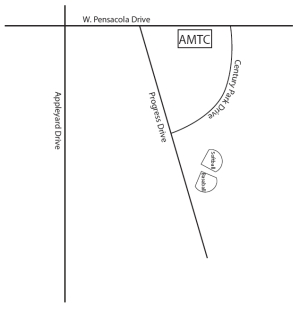
University Partners
Tallahassee Community College formed its first university partnership with Flagler College in Fall 2000 and has since partnered with Embry-Riddle Aeronautical University (2001), Barry University (2003), Saint Leo University (2006) and Thomas University (2010). TCC graduates and others can pursue bachelor and graduate degrees on TCC’s campus through the programs of its five University Partners. Degree programs are offered in a wide variety of disciplines. The administrative offices of TCC’s University Partners are located in TCC’s University Center, and classes are held on the TCC campus.
Students enrolled in courses with University Partners have access to many of the services available to TCC students. Please contact TCC’s University Partners to find a program that is right for you.
Barry University
Maggie Bowden, Director
Elain Carroll, Adviser
(850) 201-8650
(850) 385-2279
Embry-Riddle Aeronautical University
Katrina Alexander, Associate Director of Academic Support
(850) 201-8330
Flagler College
John Bruno, Dean
(850) 201-8070
Saint Leo University
Matthew Hollern, Director
(850) 201-8655
Thomas University
Bill Milford, Division Chair
(229) 226-1621, Ext. 223
Deryl Ouzts, Admissions Counselor
(800) 538-9784, Ext. 127
Campus, Service Centers, Maps/Locations
Tallahassee Community College has one of the most beautiful community college campuses in the nation. Most buildings are constructed in classic brick, which creates a traditional collegiate appearance while projecting a sleek, modern design.
The College’s beauty does not stop at the front door. Interiors are attractive, functional and user-friendly. The campus offers wireless technology and cutting-edge instructional technologies.
Facilities located off the main campus, including the Ghazvini Center for Healthcare Education, the Florida Public Safety Institute and the three service centers, also provide an inviting learning environment for both students and community members. The College’s commitment to the Big Bend region is reflected in its off-campus service centers located throughout the tri-county service district: TCC Capitol Center, The Quincy House and The Wakulla Center.
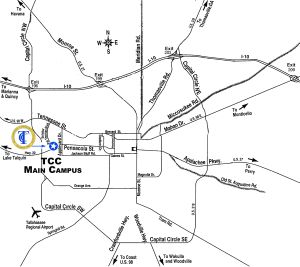
Florida Public Safety Institute
The Florida Public Safety Institute is located in Gadsden County, 14 miles west of the main campus. The Institute, which sits on approximately 1,500 acres, is a unique, world-class learning environment that provides training in realistic contexts conducted by experts from all areas of criminal justice.
The Institute includes the Pat Thomas Law Enforcement Academy (PTLEA), which offers basic recruit courses in law enforcement, corrections and correctional probation. The Academy serves 65 state, regional, county and municipal agencies representing more than 4,000 officers. In addition, PTLEA hosts training for a number of federal agencies, including the Federal Bureau of Investigation, Alcohol Tobacco and Firearms, U. S. Secret Service, Federal Fish and Wildlife Agency and National Guard. The Florida Public Safety Institute also provides training in telecommunications, private security and law enforcement intelligence.
The Institute partners with the Tallahassee Fire Department to operate the Tallahassee Fire Academy, which provides state-approved training to those seeking employment as a firefighter in Florida. The Institute also provides a 330-bed dormitory and a full-service cafeteria that seats more than 500 people.
The Florida Public Safety Institute is expanding its continuing education efforts by attracting more officers to FPSI’s campus for training, exporting training to other areas of the state and nation, and using distance learning to reach new audiences. For information, call (850) 201-7000 or visit fpsi.tcc.fl.edu.
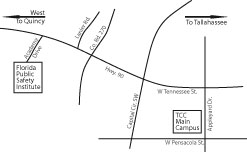
Ghazvini Center for Healthcare Education
The Ghazvini Center for Healthcare Education is located in Tallahassee’s healthcare corridor, near both hospitals and other healthcare providers. The Ghazvini Center is the home of TCC’s diagnostic medical sonography, emergency medical services technology, nursing, paramedic, radiologic technology, respiratory care and allied health programs. The facility offers cutting-edge technology and houses classrooms, conference rooms, a library/learning commons, laboratories, a simulation center and the administrative offices of the Division of Healthcare Professions and the Allied Health Programs. For information, call (850) 558-4500.
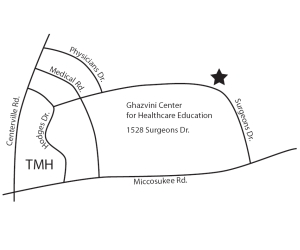
Quincy House
The Quincy House plays a significant role in community development, with a keen commitment to serving the children, adults and senior citizens of Gadsden County. After-school and summer programs supplement classroom learning and help and encourage students to complete high school and attend college. Adult learners have access to non-credit course offerings, adult education programs, community workshops, computer training and career counseling. The Quincy House also serves Gadsden-based TCC distance-learning students as a proctored testing center, and as a site for administration of the Florida Postsecondary Education Readiness Test, thereby increasing access to college for area residents. Event space is also available for public use. For information, call (850) 558-3620.
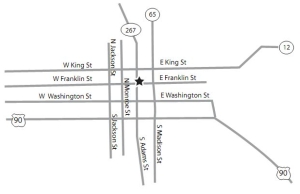
TCC Capitol Center
The TCC Capitol Center offers something unmatched by any other meeting or classroom facility in Tallahassee— a location directly across the street from Florida’s state capitol. TCC Capitol Center features state-of-the-art technology and is designed with enough flexibility to host a variety of events. Business suites, meeting rooms, exhibit space and classrooms are sure to meet the needs of any organization. Numerous professional development courses are also offered. For information, call (850) 201-7662.
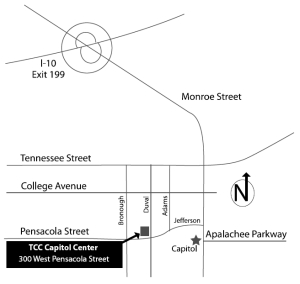
Wakulla Center
The TCC Wakulla Center offers programs, classes, continuing education courses and events to help community members increase their workforce marketability, job performance and job satisfaction. The Wakulla Center also offers classes for personal enrichment and enjoyment. The Center is home to TCC’s Ecotourism Institute and the Green Guide Certification Program. The Wakulla Center is expected to begin offering limited for-credit classes after moving into a larger facility in late 2012. For information, call (850) 922-6290.
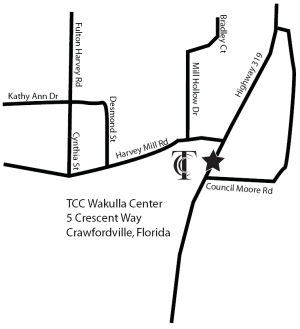
|